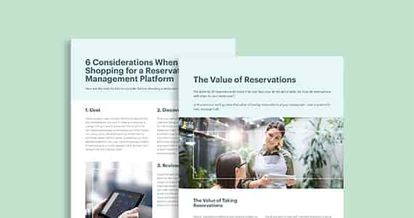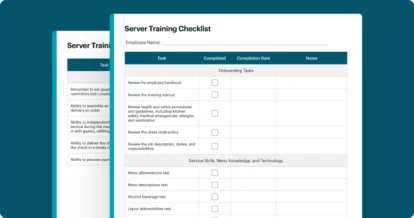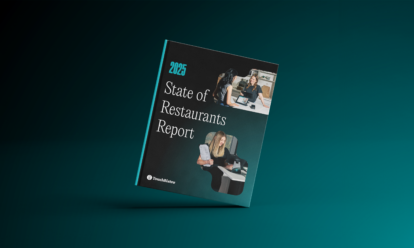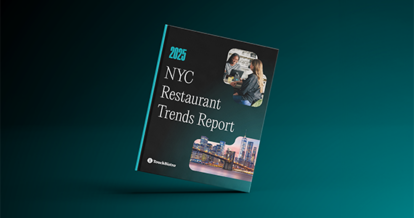The backseat mental wellness has taken in the restaurant industry has gone on for too long, especially given the industry’s reputation for asking workers to put the guest first, work long hours, and navigate high levels of stress. All this has unfortunately led workers in the hospitality industry to experience a range of mental health struggles, including restaurant burnout, depression, and even resigning from their jobs altogether. It’s clear that it’s time for operators and managers to flip the script, and to prioritize mental health in restaurants by supporting hospitality workers on the job.
To help operators learn strategies for how to introduce the conversation surrounding mental health in restaurants and improve the way they care for their employees’ wellness, we spoke with Jasmin Parks-Papadopoulos, Chief Growth Officer at Culinary Hospitality Outreach Wellness (CHOW).
With over three years of experience helping restaurants implement health and wellness strategies, Jasmin from CHOW shares:
- An overview of the current mental health landscape
- Four strategies for operators to improve wellness in the workplace

Meet Jasmin Parks-Papadopoulos, Chief Growth Officer at CHOW
Jasmin herself has extensive experience working in the restaurant industry, which allows her to offer a unique personal perspective on the industry. She now has a successful career on the other side, helping restaurant operators and their staff tackle the mental health challenges they’re experiencing in the hospitality industry.
Jasmin considers herself a CHOW success story after coming to CHOW herself to receive personal support as she struggled with her mental health during her time working in the restaurant industry. After deciding to exit the industry after a well-established 14 year career, she joined the team at CHOW to bring light to and to spark conversations around mental health in hospitality.
CHOW’s mission is to “support wellness within the hospitality industry and to improve the lives of our community through shared stories, skills, and resources.” The wellness organization focuses on helping this niche group of individuals by offering weekly discussion groups, recipes for wellness, workplace wellness toolkit, and an amuse mental health course.
And as part of the team at CHOW, Jasmin explains that she feels “incredibly fortunate to be able to give many folks on the other side so many resources, skills, and coping strategies for navigating the industry. I think, if I had known about them when I was in the industry, these strategies would have protected my career longevity while I was in the field.”
The Current Mental Health Landscape
While Jasmin has plenty of actionable tips for today’s operators, she stresses that it’s important to understand how things got to this breaking point in the first place. And to do that, she says we need to rewind back to the pandemic to understand exactly what restaurant workers have been up against.
As Jasmin explains, “folks were essentially deemed essential workers, but weren’t always compensated that way. The whole world got to see, through viral content, that hospitality workers, who were just trying to survive a shift, were getting berated and yelled at.” In other words, workers in the hospitality industry suffered immensely throughout the pandemic. Fortunately, Jasmin shares that one outcome of this time was that it shed a lot of light on the stress restaurant workers face and kickstarted the conversation around mental health, with workplaces now starting to ask questions, like “’why do we say the customer is always right?’ and ‘what are the implications to saying the customer is always right?’”
With that said, “There’s a slow burning cultural shift in which we are recognizing that, much like physical health, mental health is something that you cannot check at the door,” Jasmin explains. And when it comes to talking about mental health, “The industry is changing, because not many people four years ago would listen if mental health resources were brought up.”
So while the hospitality industry is slowly making progress, the industry is still in the early days of actually addressing these issues, especially given how many workers are still experiencing mental health-related challenges at work.
For instance, according to a study of Glassdoor reviews released from BBADegree.org the restaurant industry has the highest degree of employee restaurant burnout. Plus, according to Nation’s Restaurant News, “Overall, the restaurant industry scored 98 out of 100 on the burnout scale, with stress and long hours being mentioned most often in reviews.” Some of the other mental health in hospitality challenges workers are facing include, 63% suffering from depression and 65% reportedly using substances at work, according to data from CHOW.
Not only is all this hard on staff, but deprioritizing mental wellness has also impacted owners and operators, who are experiencing low rates of retention and lack of staff engagement.
4 Strategies for Operators to Improve Wellness in the Workplace
It’s clear that the food, beverage, and hospitality industry has a long history of staff suffering and experiencing mental health challenges. Fortunately, there are solutions and Jasmin from CHOW is well-versed in actionable strategies for improving wellness in the workplace – strategies any operator can use to better manage restaurant staff while also prioritizing restaurant employee wellness.
Here are Jasmin’s top four tips for improving mental health in restaurants.
1. Invest in People
As an operator and leader in the hospitality industry, you know that the success of your restaurant can heavily depend on the employees that help run it. With that said, Jasmin brings up a question for operators and the industry as a whole, “What have we done to make the workforce more sustainable so folks want to stay in the industry, stay well, and are able to treat this as a career?” The answer, to put it simply, is to spend the energy to invest in your employees moving forward.
According to our 2025 State of Restaurant Reports, 44% of operators report that staff turnover has been their number one labor concern in the past year.
So what kind of people-related investments can you be making as an operator or manager to increase retention efforts? Well, according to a 7shifts report, here are three things employees want and look for from their place of work that managers and operators can implement to increase retention efforts.
- Growth Opportunities: Employees who seek a long-term career in hospitality want growth opportunities at their place of work, such as training, upskilling, and promotions. By investing in your employees’ growth, you’re more likely to retain them and they’ll grow with your business.
- Increase Employee Recognition: 64% of employees say recognition would increase engagement. If you take the time to recognize your employees, and do so often, they’ll feel appreciated and will be less likely to look elsewhere for work.
- Offer Flexible Scheduling: 56% of employees choose hospitality due to the flexible work schedule. By offering more flexible scheduling, you’ll be able to retain those who have busy personal lives, like parents, students, or caregivers.
And to further emphasize the importance of investing in your employees, based on Jasmin’s own experience, she shares, “I think when we heavily invest in people and we allow them to be people, they are able to thrive in an environment that they are in. I know that the reason I ended up leaving the majority of hospitality jobs is because it was just unsustainable.”
In short, investing in employees can help operators learn how to manage restaurant staff well, while solving the challenge on how to reduce employee turnover in restaurants.
2. Normalize the Conversation Surrounding Mental Health
In an industry like hospitality, where the primary focus is on the guest experience, employees often have to leave their mental health struggles at home and are encouraged not to bring them into the workplace. However, a big step to improve the wellness of your employees’ is to normalize the conversation around mental wellness in restaurants.
According to Restobiz, “restaurant owners, head chefs, and industry leaders have a responsibility to set the tone for a supportive and empathetic culture.” So one way to start normalizing the conversations about mental health in restaurants is for you, as a leader, to share your mental health story with your employees.
In fact, according to Forbes, studies show that 88% of employees appreciate when company’s leaders talk about their own mental health. By sharing your story, you’re opening the lines of communication about mental health with your employees, in hopes of making them more comfortable to share their struggles, as well. Ultimately, this helps reduce the mental health stigma within the workplace and creates a safe space for everyone.
Jasmin emphasizes the importance of normalizing these kinds of conversations by explaining that sharing her own story normalizes “the fact that I’m bringing something out from under the rug. We are addressing something that has been long-calcified scar tissue in our community.” Like she has done in her work with CHOW, she encourages hospitality leaders – be they chefs, CEOs, general managers, or anyone else in a position of authority – to, “talk freely and talk often.”
3. Share Your Successes and Strategies with Other Operators
The food and beverage industry consists of a network of individuals who are oftentimes experiencing very similar challenges, whether it be the struggle to retain employees or a lack of employee engagement. According to Jasmin, many operators don’t know how to lean on each other for support, and she urges operators to share their strategies and successes with others in the hospitality industry so leaders can learn from one another. This can be especially valuable to do if you’re a first-time operator or leader in the restaurant industry. You can seek out a mentor in the industry, or at the very least network with other professionals to learn and exchange experiences with.
In fact, according to Total Food Service, “mentorship equips budding professionals with the right tools and resources to navigate challenges with resilience allowing mentees to thrive.” And as a result, “A mentee who rises through the ranks with knowledge and wisdom from those that came before them can create better environments for employees and customers.”
As Jasmin explains, sharing your successes and strategies can be as simple as, “if you are experiencing some sort of success at your restaurant, like you haven’t had anybody quit in a year, then write an email to all your hospitality friends, including any owners and managers you know, and share that information with them – share what’s working.” On the flip side, she mentions that, “if you are struggling, reach out. For instance, if you are experiencing folks quitting out of nowhere and you can’t understand why, ask those in your network for their advice.”
Jasmin explains that by reaching out to share your struggles and wins with people you know in the industry, you can learn to address these challenges and improve the wellness of your employees, while simultaneously helping other leaders do the same.
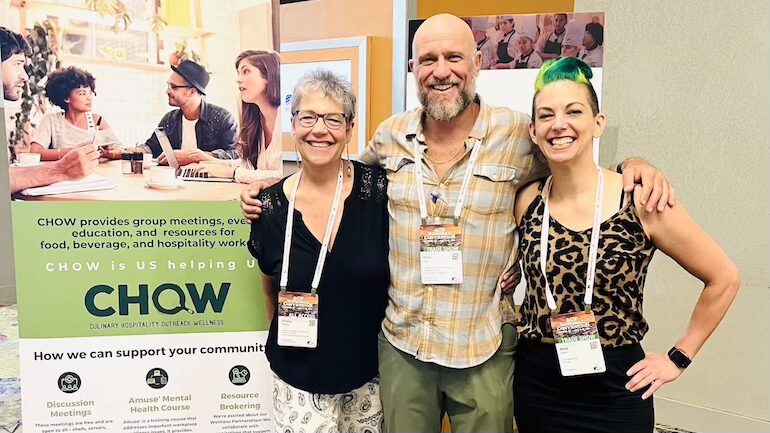
4. Try a CHOW Resource
While many operators want to have an open conversation about mental health in restaurants, they may stop themselves because they don’t know how to start those conversations in the first place. Based on firsthand experience, Jasmin shares that in past workplaces, “we used to shy away from conversations around mental health because we didn’t have the tools to talk about them.”
That’s why, as part of CHOW’s mission and commitment to the food, beverage, and hospitality industry, they give people access to those resources to help leaders guide those conversations.
“CHOW considers itself a resource broker. So we work in partnership with so many other organizations, because we realize CHOW might not have developed the programming you need for whatever challenge you’re facing at the moment. We will also make sure you have a warm hand over to the next organization and we are checking in with you the next week,” Jasmin explains.
Jasmin shares that CHOW wants to be able “to speak from firsthand experience” when sharing these resources with those who are experiencing these challenges. As a result, hospitality industry workers can feel confident in referring and using CHOW’s resources to improve the wellness of themselves and their employees.
Here are just a few examples of those vetted resources that Jasmin provides to operators, like yourself, to guide conversations around mental health with your staff and improve their wellness.
CHOW’s Workplace Wellness Toolkit
As a starting point for many operators new to talking about mental health restaurant wellness and looking to improve their restaurant management skills, CHOW offers a free wellness toolkit. CHOW’s wellness toolkit provides actionable tips for restaurant operators, including a tip called the “temperature check.”
According to Jasmin, the “temperature check” is when operators or leaders ask their staff on a scale of rare to well done how they are and how they’re feeling. “We encourage doing the temperature check in your community, in your restaurant, at pre-shift meetings with your staff –all the time”, says Jasmin.
While in theory, the temperature check sounds great, but as a restaurant operator you may be questioning how the tips provided in this wellness toolkit actually work in practice. Well, Jasmin shares, “We have folks sharing that the cool thing about the workplace wellness toolkit is that it’s a living document. So when operators get back to us six months later and say they’ve been doing the temperature check for six months and here’s what they’ve noticed, we can make adjustments. We know these strategies are working because folks are sharing overwhelming positive feedback with us,” Jasmin explains further. Therefore, as an operator, you can feel confident that other leaders in the industry are finding this toolkit helpful.
Attend a CHOW Meeting
Another resource CHOW offers those in the food, beverage, and hospitality industry is a network to talk to and share your mental health restaurant struggles. Jasmin highly encourages people to “come to a CHOW meeting, they’re free.” The goal of these meetings is to provide a safe and protected space for those whose workplaces don’t offer an employee assistant program for someone to talk to and share their experiences. If you’re interested in attending a meeting, you can take advantage of one via online or in-person. Attending a meeting can help you address your own mental health struggles, but also help guide you as you do the same for your employees.
With the restaurant industry and other adjacent industries’ massive history of brushing mental health under the rug, it’s about time to start prioritizing the wellness of your employees (and yourself), and to not shy away from having those tough conversations. And in doing so, restaurateurs can learn how to be a good restaurant manager and may just end up seeing a massive pay off for their business in the long-run.
Free job application template for restaurants
Sign up for our free weekly TouchBistro Newsletter



